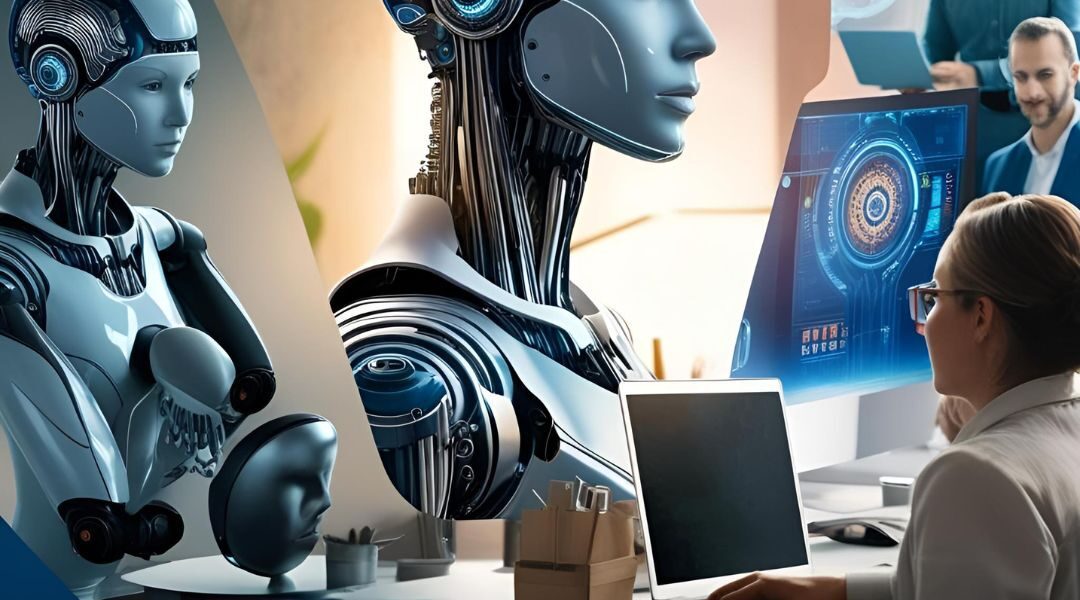How Artificial Intelligence Is Reshaping Jobs and the Future Workforce in 2025

Artificial Intelligence (AI) is no longer limited to science fiction or tech labs — it’s part of our daily lives. From the apps on our phones to the systems that run global businesses, AI is changing how the world works. One of the biggest areas affected is the job market. As machines get smarter, many people are asking: Will AI take over jobs? What will the future of work look like? And how can we prepare?
In this article, we’ll explore the impact of AI on jobs, which careers may disappear, which will grow, and how to thrive in an AI-powered future.
Understanding Artificial Intelligence in the Workplace
Artificial intelligence refers to computer systems that can think, learn, and solve problems like humans. These systems use data to make decisions, automate tasks, and improve over time without needing constant human input.
Businesses around the world are now using AI to:
- Automate customer service through chatbots
- Predict consumer behavior using data analytics
- Manage supply chains efficiently
- Speed up tasks like hiring or bookkeeping
This shift is helping companies save time and money, but it also raises concerns about AI replacing humans in many jobs.
Jobs at High Risk of Automation
AI works best with tasks that follow a pattern or don’t require emotional intelligence. Because of this, some job roles are more at risk of disappearing than others. These include:
- Data entry roles
- Call center agents
- Cashiers and retail workers
- Transport drivers (due to self-driving vehicles)
- Basic-level administrative positions
In many industries, we are already seeing these jobs being replaced or reduced. The connection between automation and job loss is becoming more visible every year.
Jobs That Will Thrive Despite AI
While AI may replace certain jobs, many careers will remain safe — and some will even grow stronger. Roles that require creativity, human connection, or strategic thinking are hard for AI to replace.
Here are some of the best jobs safe from AI:
- Doctors, nurses, and caregivers: These roles require empathy, judgment, and physical presence.
- Teachers and educators: Learning is about more than facts — it’s about relationships and understanding.
- Writers, designers, and artists: Creativity still belongs to humans.
- Engineers and IT professionals: The people building and managing AI tools will always be needed.
- Skilled tradespeople: Jobs like electricians and plumbers require hands-on problem solving AI can’t do.
Rather than fearing change, professionals in these fields can use AI as a tool to make their work better and faster.
How AI Is Changing the Workforce in 2025
The future of work after AI isn’t about robots replacing people — it’s about humans and machines working together. AI is helping people be more productive, make smarter decisions, and focus on meaningful tasks.
Here’s how work is changing:
- Many tasks are being automated, but entire roles are evolving, not disappearing.
- Teams are becoming global, connected by AI-powered platforms and remote tools.
- Decision-making is now more data-driven, thanks to predictive AI models.
- Employers are looking for people who can think critically, adapt quickly, and use technology wisely.
Instead of fearing how AI is changing the workforce, it’s time to embrace the change and grow with it.
How to Prepare for an AI-Driven Job Market
If you’re worried about job security in the age of AI, don’t panic — prepare. Here are some steps you can take to future-proof your career:
- Learn digital skills: Coding, data analysis, and cloud computing are in demand.
- Strengthen soft skills: Communication, problem-solving, and creativity are more important than ever.
- Stay curious: Follow tech trends, attend online workshops, and keep learning.
- Use AI tools: Don’t fight AI — use it to your advantage. Tools like Grammarly, ChatGPT, and Canva can boost your productivity.
- Be flexible: Roles will change, and those who adapt quickly will stay ahead.
If you’re wondering how to prepare for the AI future, the answer is simple: keep learning, stay flexible, and use AI to grow.
Will AI Replace All Jobs?
It’s a common fear, but no — AI will not take over all jobs. It will take over tasks, not necessarily entire careers. For example, an accountant might let AI handle the number crunching, while they focus on advising clients.
The goal of AI isn’t to remove humans — it’s to remove repetitive work. That leaves us free to do more creative, meaningful, and strategic things.
So instead of fearing that AI will replace humans, we should focus on how we can work with AI to achieve more.
Final Thoughts: Embrace the Change, Don’t Fear It
AI is already shaping the world around us, and its influence will continue to grow. While change can be uncomfortable, it’s also full of opportunity. By understanding the impact of AI on jobs, we can better prepare for what’s ahead.
The future of work isn’t about man vs. machine — it’s about man plus machine. And in that future, those who learn, adapt, and evolve will thrive.
So, whether you’re a student, professional, or business owner, the best time to prepare for the AI-driven future is now.




